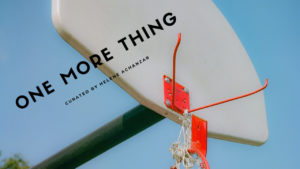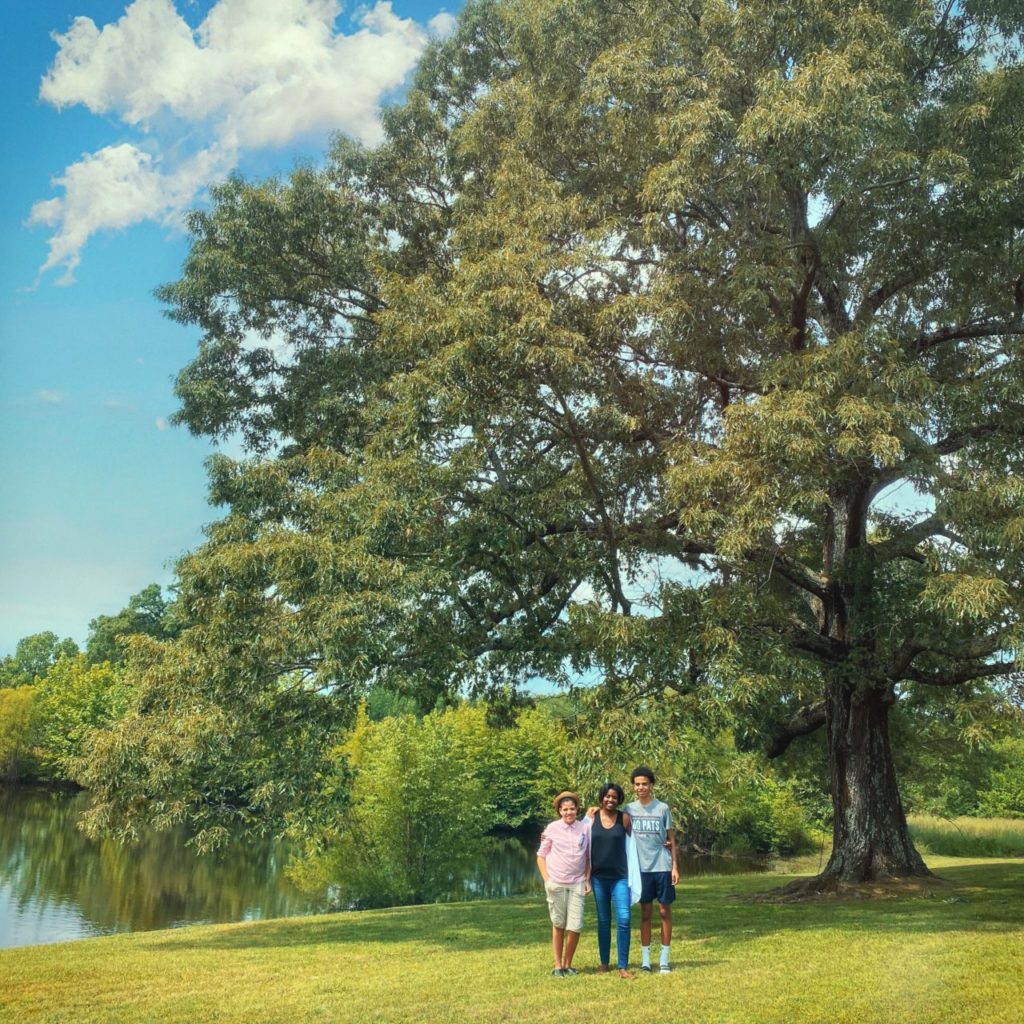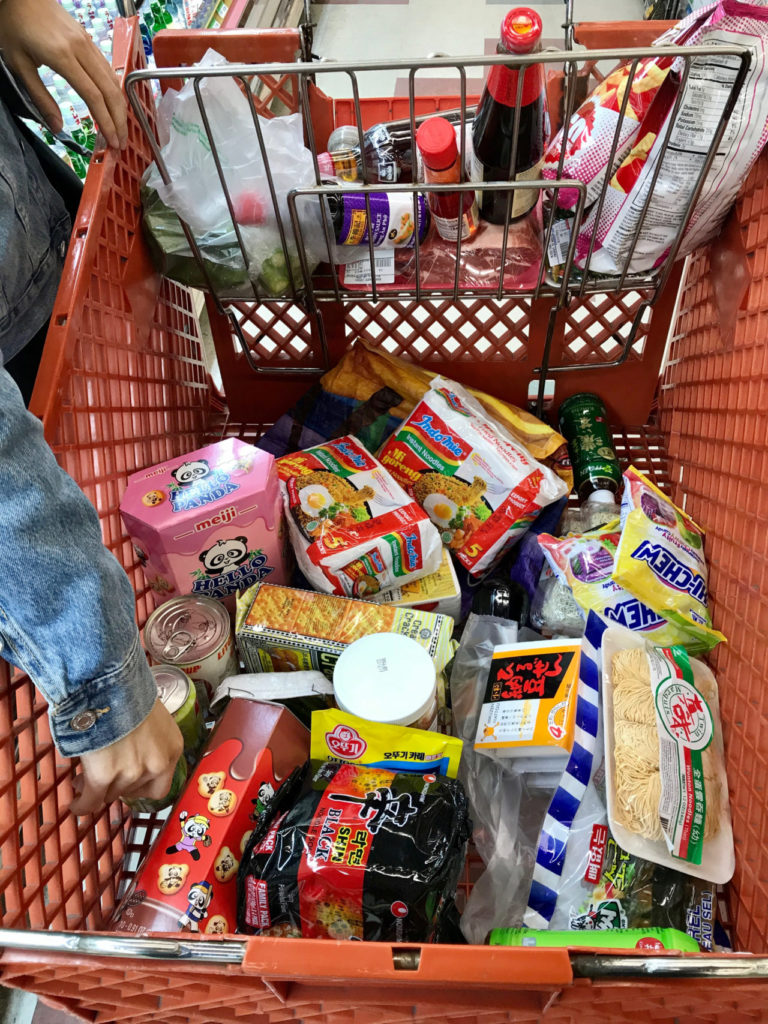
One More Thing is a series featuring Poetry Northwest contributors and other writers in conversation. This first installment features a dialogue between January Gill O’Neil and Andy Sia. January’s poem “Mississippi Season” can be found in the Winter & Spring 2021 issue of Poetry Northwest. Andy’s poem “Rabbit God Unravels the Red Thread of Fate” was published on our website in March 2021.
Andy Sia: Hi January! It’s good to talk with you. I still think of the class you taught while you were the Grisham Writer-in-Residence here at the University of Mississippi.
It’s snowing as I write to you right now from Oxford, a very different place from the one where you arrived and left. I love how sensory and lush “Mississippi Season” is—it captures the heat I associate with this town.
Desire and the body are closely twinned in the poem. In it, the speaker describes a physical and emotional relationship with the other, and you extend a physicality to other abstract notions. Absence is likened to a drought: “I break / all over again / after a drought / of no kissing, no touch.” Presence, another type of heat. Isolation, like still water. Can you talk about how the landscape of Mississippi worked its way into the making of this poem?
January Gill O’Neil: Good to talk with you, too, Andy! Gosh, my time in Oxford was less than a year ago, and it is still with me. I miss working with you and the rest of your classmates. What a gift.
I’m writing past midnight, and it is snowing here in Beverly, Massachusetts. You may have more snow on the ground than I do!
Thanks for the kind words about my poem. Like much of the poetry I wrote on fellowship, “Mississippi Season” is both intimate and honest. I fell in love with the landscape—magnolia, kudzu, red clay, deer—and somehow, love came back into my life. I became so fully immersed in what was around me that it felt like a drought ending.
And while my poem doesn’t reflect it, I also felt trauma in the land. Not a day went by that I did not recognize that enslaved people walked every inch of that dirt. Mississippi has changed me forever.
In your stunning poem “Rabbit God Unravels the Red Thread of Fate,” you also talk the beauty and the trauma of a place (“How to enact beauty out of terror”). I am in awe at how you sketch each moment. How does the external world influence the internal for you?
Andy: The external world is a source of wonder and fascination. It’s a tether to memory. During summer months in Mississippi, I like to sit out on the porch and listen to the cicadas call. It’s such a hypnotic, mesmerizing sound. It also reminds me of Brunei, where I grew up. I moved to a small town in Central New York for college, then back to Brunei again, and now I’m here in Oxford. I’m not sure where to next. I find myself registering the familiar and unfamiliar in my surroundings constantly.
In “Rabbit God” the speaker projects onto the external. He speaks of willing his surroundings, of making buds erupt. I imagine this is within his capabilities as a deity. He wills himself to will. I wanted to depict the character as being open to a kind of beauty and reemergence typified by the natural world.
Images, for you, seem to be a link to memory as well. I’m thinking of the vivid way in which you lay out the relationship unfolding between the speaker and her love. You make the wonderful comparison of the self to “a kind of carnival fish / in a plastic bag / floating in my own still water” and the extension of the metaphor to “someone / [flipping] a red ring of the mouth /of a glass jar.” What kinds of images draw you in? How do you render an image on the page?

January: As writers, we are world-builders. All of our past experiences help us create these rich, vivid environments: the landscapes, the emotional terrain, the reflections and deliberations we have with ourselves. We inhabit that space on the page for a short time and then go on to build another empire of words. “. . . dwindled to a word in the mouth at this point, then nothing at all, not even the wind.”
For me, world-building starts with an image. And then language becomes the means by which those images live. In “Mississippi Season” the carnival fish image came quickly. It just seemed to fit. So the joy comes from finding the right words to make the image work in the framework of the poem.
Poetry is a physical thing. I believe your curiosity, Andy, has fostered a love of the natural world. How important is imagery in your work? How important is sound and language?
Andy: Imagery functions to engage the senses. I’m never merely thinking through a poem, but feeling. I hope to impart some sense of feeling always, and imagery is one way for me to do that.
Sound, too, is important. I think of sound and language concurrent with voice. I mean both the voice on the page and spoken word. When I think about my experiences with English, I think of the ways in which my articulation of the language has been met with disciplinary measures. My turn of phrase, my pronunciation, my accent. Poetry is a way for me to wrest with the uneasiness I feel with the language, to turn the language on itself again and again. Poetry is, as you said, also an act of joy. Working with language—assembling together words, sounds—is pleasurable. I hope to cultivate a poetic voice that rankles with beauty.
I do try to lean into curiosity, so thank you for pointing that out! As writers we all have our preoccupations. What’s one more thing besides writing that you’ve been engaged in, January?
January: Andy, I feel like I’m still coming down from the election—and the last four years of the previous administration. While the pandemic has been terrible for so many, I’m making the most of my time. I’m teaching (virtually) and writing poetry, of course. But I’m trying to lean in more deeply to writing as a regular practice, wherever my curiosity takes me. I’m also learning more about Mississippi, from its history to the landscape, because I think that state has a lot to tell us about current race relations.
My daughter has been cooking a lot—breads, vegetarian dishes, fish—so I have been her sous chef! That also means trying to stick to some sort of workout plan. I’m practicing yoga for the first time on a semi-regular basis. Lots of reading and too much Netflix. We’re loving WandaVision on Disney+.
Andy: I love WandaVision. I’ve also been watching a lot of cooking videos on YouTube of late, in hopes that that will translate to better skills in the kitchen and also just for fun. There’s something so pleasing in watching someone make a dish—or anything, really—from scratch. The appeal of a lot of these cooking videos is the can-do attitude of the hosts for me. Want homemade mozzarella? Let’s curdle some milk! Cook a whole chicken? You got it. Set a dessert on fire? Done and done.
I’m a pretty habitual person, and in the kitchen I’m used to making the same, basic dishes for myself again and again. So my mediocrity as a cook comes from the lack of trying. But watching these videos, I feel like I owe it to myself to take more risks in the kitchen. Or just to have more fun with cooking. To make something delicious. The possibilities are endless! And if these cooking hosts are to be trusted, perhaps even I can find it in me to make a full-course meal and roundly impress family and friends one day.
Do you have a go-to thing that you make when you’re hoping to impress?
January: Love that you’re cooking new things, Andy. There’s something so satisfying about making a new dish from scratch, even when it doesn’t turn out exactly as planned. My daughter made sourdough and kept the starter alive for a few months. Took a few tries, but she did a nice job.
I like to cook but don’t love it. That being said, my signature meal is crab cakes! *Legendary!* I’ve made that meal so often I put the ingredients together from instinct. My mom used to make crab cakes and deviled crabs from Chesapeake blue crabs (I’m from Virginia). And I am extremely judgmental when it comes to restaurant crab cakes—usually too much breading.
Are there recipes you make that remind you of home?
Andy: It’s a simple staple, but I like to make fried rice. It’s such a versatile dish: you can put your own spin on it and make use of the ingredients you have in the fridge. My mother puts Spam, shrimp, fried egg and mixed vegetables in hers, and that’s what I do too.
I always eat well when I return to Brunei. So many dishes that I miss from across the ocean: wine chicken mee sua, anchovy flat noodle soup, wat tan hor, nasi lemak, keropok and acar, and more. I WhatsApp my mother to ask how to make something now and then. She is exacting when it comes to ingredients, which can be tough because I can’t always find the exact brands and matches here, but instinctual when it comes to the cooking itself, which is also tough for someone like myself who isn’t as confident in the kitchen and would rather get an exact measurement sometimes.
I love crab cakes, January, and wow, that poem of yours makes me hungry for some! Hearing you speak about your signature crab cakes and listening to your poem remind me that food connects us to home and often is a labor of love. I’m glad to hear that you’re making the most out of the difficult year and moreover, that you’re with family, loved ones. It’s wonderful to hear that you’re cooking and bonding with your daughter. A few of my friends have reported attempting sourdough too during the pandemic—props to her for getting it right!

January: I’m glad you have recipes like fried rice that connect you to home and family as well. What a difficult year it has been for all of us. Besides cooking, how else do you unwind? What do you to when you just want to chill out?
Andy: To unwind I like to play computer games. Most recently I’ve been playing Stardew Valley, Slay the Spire, and Cyberpunk 2077.
I love video games and always have. I like the immersion that a game offers. When I play larger-scaled, open-world games I usually end up getting sidetracked from the main objectives and getting sucked into world exploration, side quests, and character and relationship progression. There’s a whole subgenre of games devoted to romantic relationships—the dating sim! I enjoy dating simulations for many of the same reasons I enjoy romcoms and romance novels: the tropes and formulaic trajectory, the likeable characters, the pure escapism of it all. Though there are recent entries that seek to complicate and even deconstruct the genre, in most instances dating sims present a less complicated version of reality: make the right dialogue choice, take another step toward eternal happiness. Easy. I love that increasingly games under the dating sim umbrella—and in general—are centering queer characters and stories.
January: My son is totally into video games. Recently, he saved his money from his first part-time job to buy a gaming computer! I’m so old school—I didn’t know they made such a thing. He likes connecting with friends in the virtual space during quarantine. Gaming kept him in touch with his friend group while we were in Mississippi for the academic year. It was a lifesaver then and now.
My hope is when we’re on the other side of the pandemic—whatever that looks like—we’ll be able to connect again in real life: at a festival or a conference, maybe even Oxford. Our poetry is a testimony to survival. We are documenting this time. I appreciate so much having this virtual time with you, Andy. Keep moving toward your curiosities and obsessions. I don’t think you can go wrong.
—
January Gill O’Neil is an associate professor at Salem State University, and the author of Rewilding (2018), Misery Islands (2014), and Underlife (2009), all published by CavanKerry Press. From 2012-2018, she served as the executive director of the Massachusetts Poetry Festival, and currently serves on the boards of AWP, Mass Poetry, and Montserrat College of Art. Her poems and articles have appeared in The New York Times Magazine, the Academy of American Poets’ Poem-A-Day series, American Poetry Review, Ecotone, New England Review, Ploughshares and WBUR’s Cognoscenti, among others. The recipient of fellowships from the Massachusetts Cultural Council, Cave Canem, and the Barbara Deming Memorial Fund, O’Neil was the 2019-2020 John and Renée Grisham Writer-in-Residence at the University of Mississippi, Oxford. She lives with her two kids in Beverly, MA.
Andy Sia is a Chinese Bruneian poet. His poems have been published or are forthcoming in The Massachusetts Review, The Missouri Review, West Branch, and elsewhere. Currently, he is an MFA candidate at the University of Mississippi, where he is a John and Renée Grisham fellow and the senior editor of Yalobusha Review.
